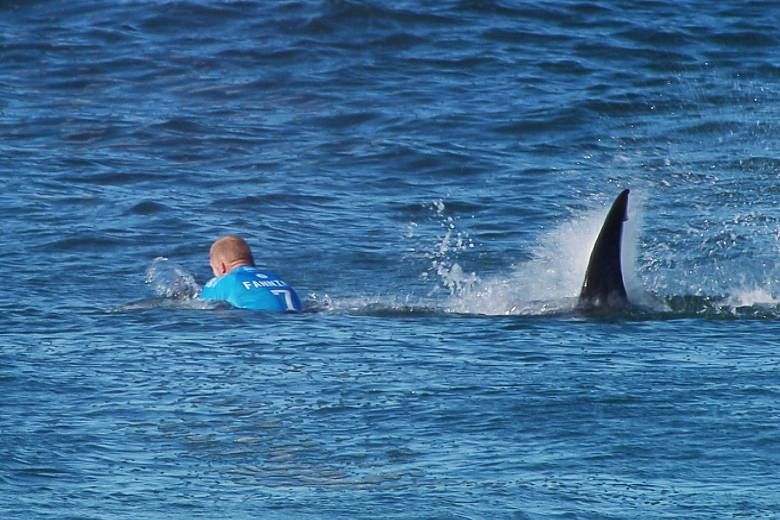From the deep, a monster glides, a nightmare comes, a mother looks. An athlete, her son, is in the sea. He is looking one way. Behind him, unknown to him, a fin has appeared. Man and shark must inevitably collide and it is live on television.
The mother watches. A mother who has lost a son before.
"It's the worst thing I've ever seen happen to any of my family because it was just there in front of me," said Elizabeth Osborne to ABC radio of her surfer son Mick Fanning who survived. "When Sean was killed in the car accident, I didn't see it. I saw this just in front of me. It was just terrible."
There is, evidently, no limit to what sporting parents must endure. When athletes pound their sweaty hearts as if to signify how tough they are, who precisely are they kidding? No one has stronger nerve than the sporting parent who sits and watches and is helpless.
In a recent Nascar race, in a scene more real than anything Transformers could imagine, Austin Dillon's car flew through the air, collided with a fence, landed upside down, was hit by another car. His grandfather, a driver himself, said to a TV Channel: "My heart kind of stopped."
Dillon lived and drives; Jules Bianchi, the F1 driver, didn't and won't. His father, Philippe, haunted, said of his lost son, "he lived his passion" and this was important, it was vital, for it somehow made a short life worthwhile. It told us also about the unspoken truth that binds sporting families: It is the athlete who takes the risk but the parent who accepts it.
The climber who claws up rock faces says mystically "I have a calling" but his parents are often his sustaining rope. Kenneth Chan tells a tale of his young son, Jonathan, a bronze medallist in diving at the recent SEA Games, once landing on his back from the 10m tower and coughing up blood. This is the diver's life and so the parent winces and then a family carries on.
Every day in sport the parent plays the pillar, not just in dangerous pursuits but in every arena, and it takes a certain strength to hold up a kid's dream. To watch them fail yet never fail them.
Of course, not every parent knows that 'adult' is presumed to mean grown up. In England this year, the cricket charity Chance to Shine, which conducted a study with the Marylebone Cricket Club, revealed that "45 per cent of 1,002 children aged eight to 16 surveyed said that the bad behaviour of parents made them feel like they didn't want to take part in sport".
An adventurer I know has parents who would rather she looked at mountains on TV rather than climb them. But mostly parents play the role of anonymous collaborator in a grand and tiring expedition. They can be found in swimming pool carparks before dawn, in the corner of arenas, a multi-tasking tribe who must be video cameraman, professional hugger, expert gluer (putting pieces of dreams back together), all-day chauffeur, cook, ball boy and actor (if the kid loses, you can't show him your pain).
A million coaching books have answers to holding a racket and swinging a club but no manual exists on parenting technique, no sporting Dr Spock exists. So fathers watch videos and plan, and mothers dig into bank balances and hope, and never can they quite get rid of insecurity.
I have sat with Colin Schooling who gets so nervous that he breaks into a skin condition because of stress when son Joseph swims. I have read stories of a father too nervous to watch his son play and instead roamed a mall till a TV shop informed him that his boy, named Pete Sampras, had won the 1990 US Open title.
I have watched a father, decades ago in a no-Internet India, sweat into the night, as he wondered how to raise money and find coaches for his gifted son. The father strove and then last week at Wimbledon his son, Leander Paes, won his 16th Grand Slam tennis doubles title.
Yet, speak to parents and it is not anxiety you hear but also joy. Yesterday, Chan spoke of the cheering in the family car, not because a medal was won but because his kids were there, in an event, competing. Yesterday, Schooling spoke of how after a race he says little to Joseph but offers only a hug and kiss. Yesterday, Wong Shoon Keat spoke of the noise around the TV in the family home when son Derek, the badminton star, plays.
There is to this relationship, at its best, an intensity and an intimacy, where love is never held hostage by result. Scared once before he flew from the board, diver Greg Louganis told himself: "No matter what I do here, my mother will still love me."
Louganis won gold and victory by a child, as it usually does, brings parents to life. But sometimes, as Mick Fanning's mother will tell you, victory comes in a child just being alive.


